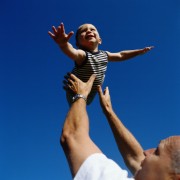New fathers can get the baby blues too
Fathers are also at risk of postpartum depression after childbirth, suggest researchers

Mood-altering hormonal changes after childbirth and postpartum depression are not only limited to new mothers but also affect new fathers, according to researchers. Postpartum or postnatal depression (PPD) can be defined as an episode of depressed mood that occurs in the weeks and months following the birth of a child, usually persisting for at least two weeks, but in some cases it can be more serious.
Although commonly associated with new mothers, about one in 10 men struggle with this mental condition after a baby is brought home, according to a study led by Dr Yaprak Harrison, a professor of psychiatry at UT Southwestern Medical Center in Dallas. One of the main reasons is that fathers tend to feel isolated or like an outsider when dealing with the newborn experience, according to Dr Yaprak. “Moms may not always realise they’re excluding dads from caring for the baby, and they may fail to realize that he wants time with the little one too,” he said in a news release issued by the UT Southwestern Medical Center.
Dr Ayesha Devina, a psychiatrist at Sanatorium Dharmawangsa in Indonesia, who was not part of the study, explained to Global Health and Travel (GHT) that cultural differences between the West and Asia can impact the risks of men developing PPD differently. “Men in Asia are generally perceived as the backbone of the family, which leads to over-expectations of responsibilities and added pressure, especially after the birth of a child” she said. “While new mothers are expected to rest, new fathers are often neglected and are piled on with additional household burdens, on top of already dealing with financial pressures. These are usually stress triggers that can lead to PPD.”
According to the study, certain men with a personal or family history of depression or alcohol or drug abuse are more likely to develop PPD than others. Other risk factors include sleep deprivation, extreme stress, lack of a support system, and marital or relationship problems.
Although some of the PPD symptoms, like extreme fatigue and changes in mood, eating or sleeping habits, are similar in both sexes, the signs displayed in men often manifest themselves in unconventional ways, making it difficult to recognise at first. “The most common and earliest indication is that men may grow hostile, angry, and irritable compared to women who tend to exhibit opposite symptoms, such as sadness and apathy,” said Dr Ayesha. “Men may deal with their depression by becoming more impulsive, drinking or gambling, and overworking.” Dr Ayesha said that some other symptoms included failure to express emotions, infidelity, reckless behavior such as unsafe driving, self criticism, abusiveness, and escapist behavior such as excessively eating, spending time watching TV, or other activities.
Men suffering from postpartum depression may need professional help, which may involve a combination of psychotherapy, medications, couples therapy and other exercises along with family support, the study suggests.
This story was originally published in the Global Health and Travel issue of October 2017
Related Articles
Processed meat can cause heart failure in men
Study puts red meat under the spotlight as a risk factor for heart disease in men
Read moreLatest Articles
Medical Care
Achieving Swift Recovery: Enhanced Recovery (ERAS) Direct Anterior Approach Total Hip Replacement
Consider total hip replacement with Alps Orthopaedic Centre's ERAS Direct Anterior Approach for faster recovery and reduced hospital stays. Learn about Dr. Jerry Chen's expertise in Singapore.
Read moreMedical Care
Enhanced Recovery (ERAS) Total Knee Replacement
Discover how Alps Orthopaedic Centre's Enhanced Recovery After Surgery (ERAS) approach transforms total knee replacement into a day surgery, offering faster recovery, less pain, and reduced hospital bills. Learn about Dr. Jerry Chen's expertise and schedule your appointment in Singapore.
Read moreMedical Care
Clinical Exercise Physiologist (CEP): The Emerging of Exercise is Medicine
How Exercising can be a Medicine
Read more